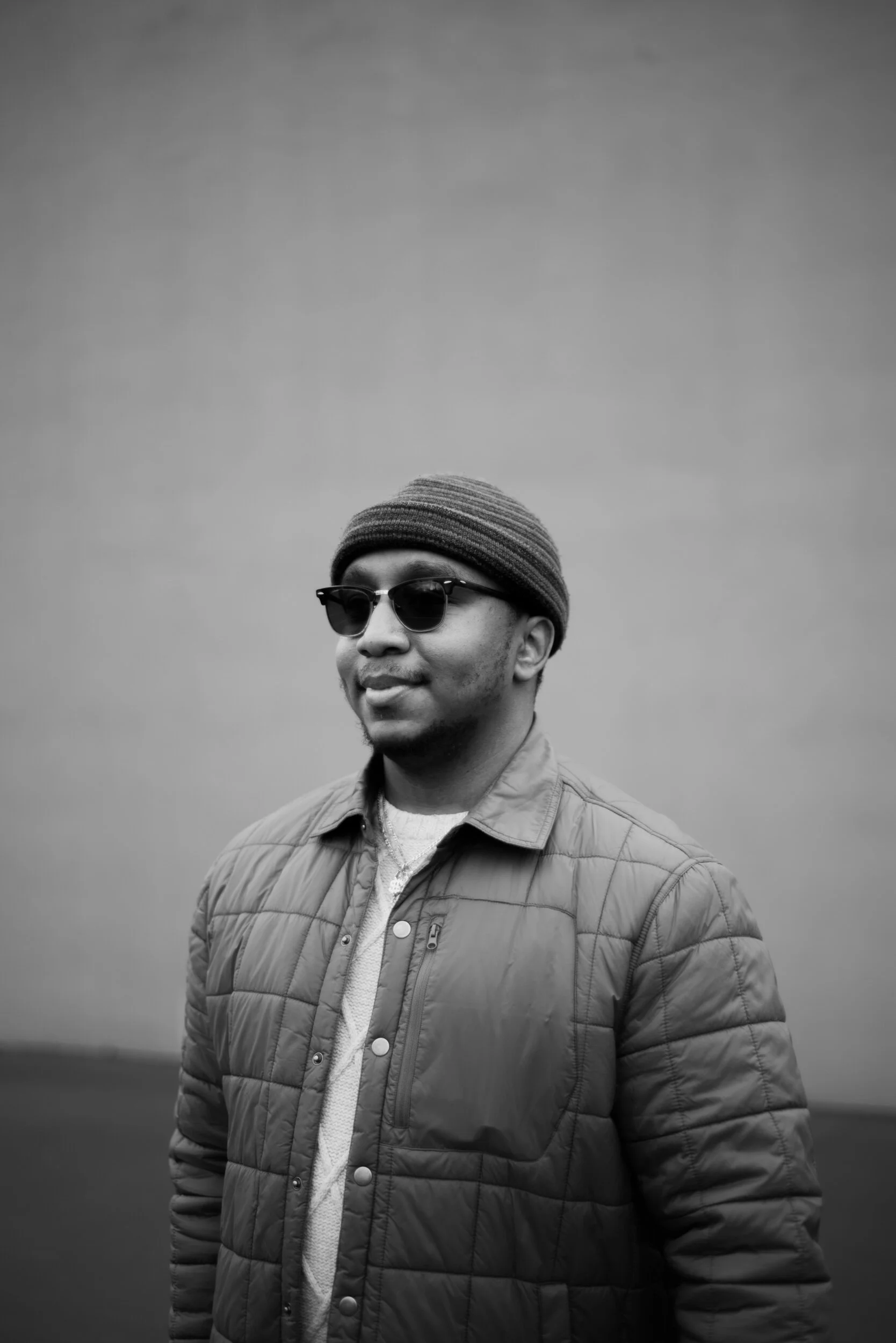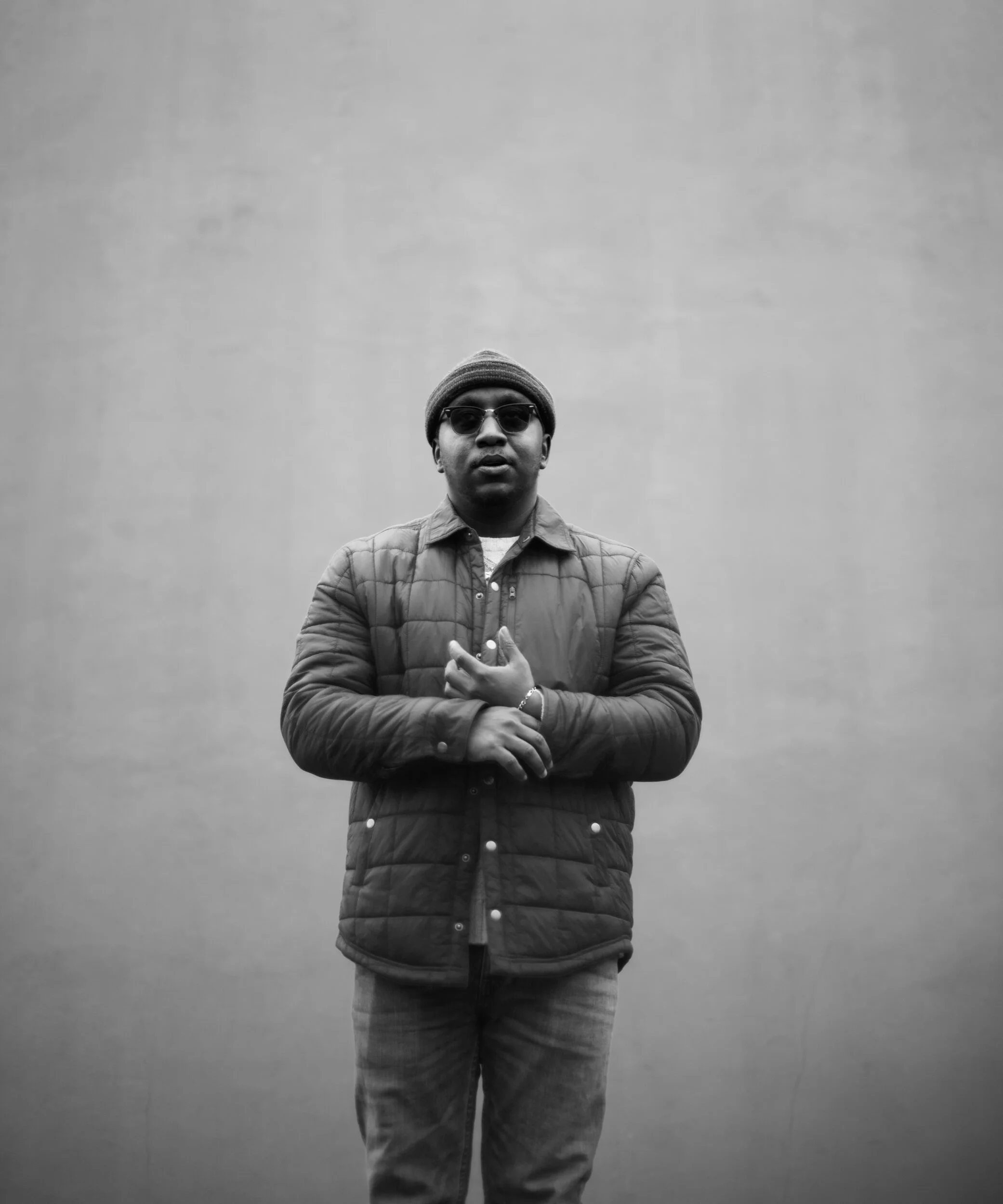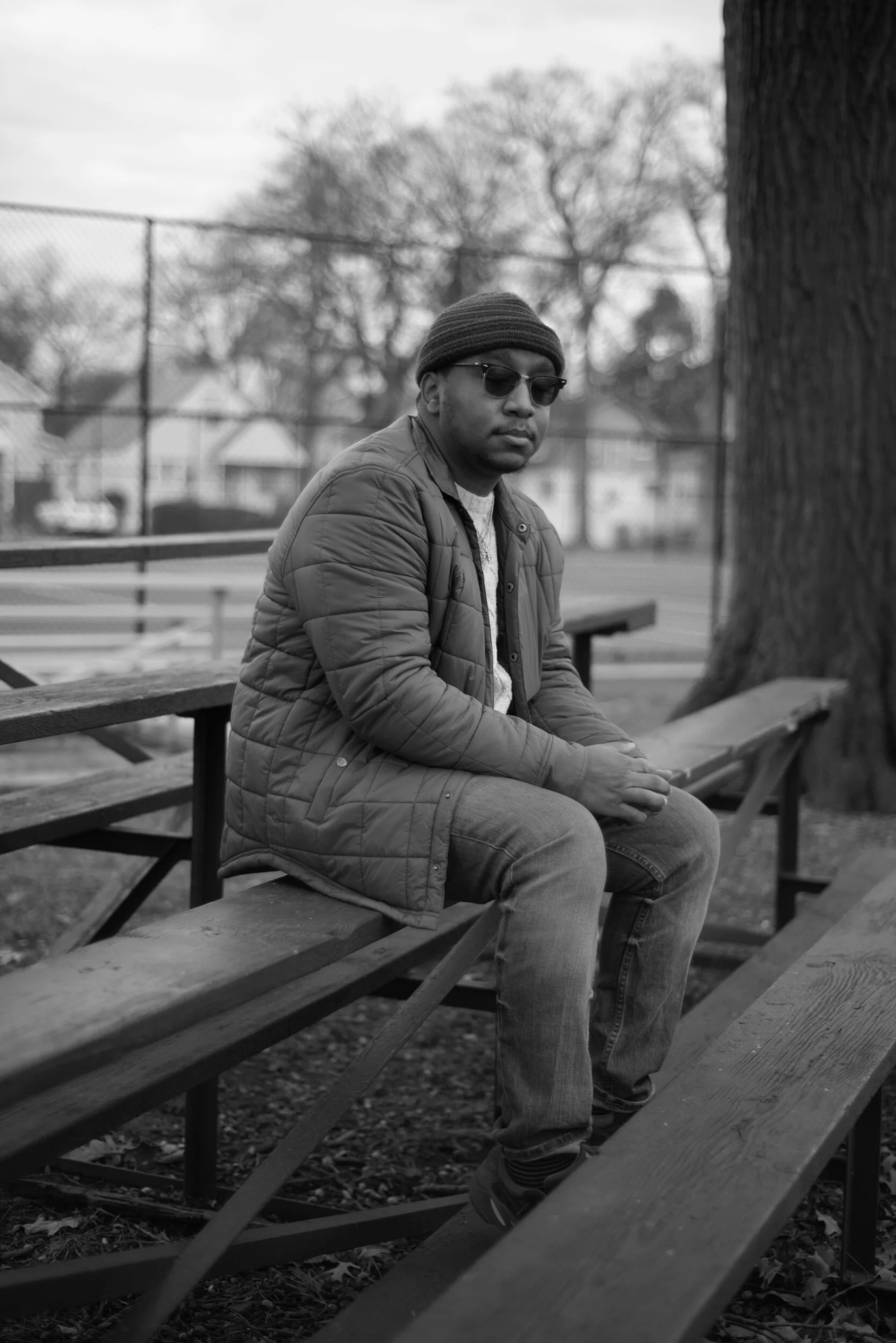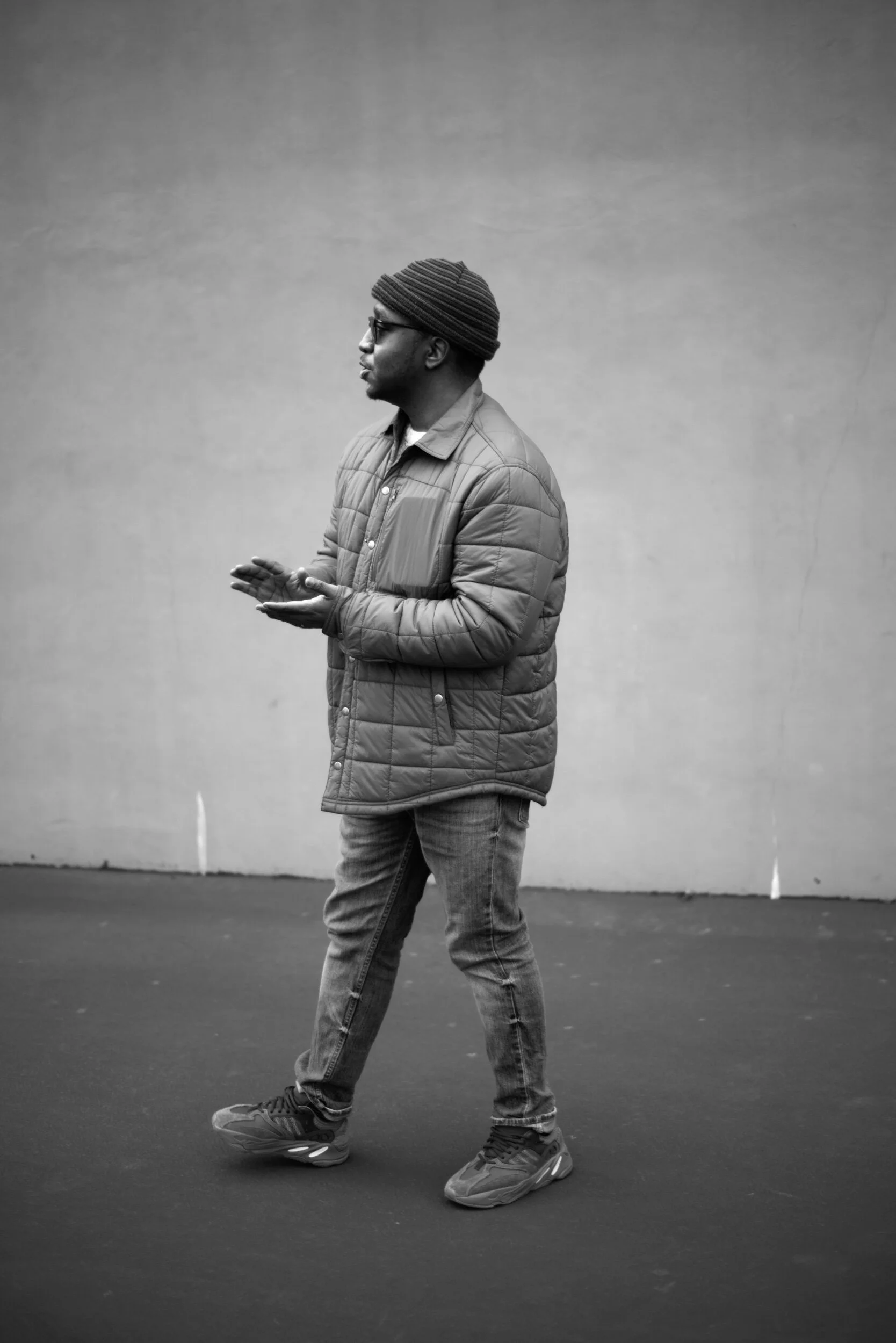If he took the Myers Briggs 16 Personalities test, I’m sure Lee Water$ would fall somewhere near the ESFP entertainer personality type. However, on the surface, one might mistake him for a mild introvert, an ambivert even. Once you get him talking, Water$ will go so far as to crack a joke or two… or three. Hell, the guy is a full on entertainer. He just can’t help himself, a being of pure charisma.
It’s interesting to see how he can make a joke out of pretty much anything. These days, days where social isolation can easily overtake most of those committed to keeping COVID-19 at bay, this talent, this inclination toward jovial humor is like gold.
Nevertheless, we didn’t meet to talk about his comedic nature, although that underscores some of his attraction to center stage. Earlier last year, Water$ released an EP entitled “Had It Up To Here,” which is a phrase best expressed toward another being while in heated debate or conflict. But for Water$, this phrase might just hold impressionism as this body of work’s core purpose.
In art, there are two different ways I like to think about purpose. While at the Moma back in 2017, before the institution's massive facelift, there was an exhibit which held some works of art from a very specific movement: the impressionist period. This 19th-century art movement sought to capture the optical effects of light in the form of paintings to convey the fleeting nature of the present moment. And there is also expressionism: one might think of Basquiat, KAWS, or Keith Haring.
The Art Story, a non-profit organization dedicated to archiving and analyzing works of art, says that “Impressionism is perhaps the most important movement in the whole of modern painting. At some point in the 1860s, a group of young artists decided to paint, very simply, what they saw, thought, and felt.”
So this idea of impressionism is steeped purely in the perception of the artist, as the world is impressed upon him. This art form being the least considerate of its audience. Based on our conversation, I’d go so far as to say that Mr. Water$ could sit amongst Claude Monet and Vincent van Gogh in his motivation.
Water$ is sitting at my dining room table, with his hands clasped together like some distinguished dignitary. He came into that same room moments earlier with a mysterious nature about him, a shell of timidity and shyness that read as reservation. But I’ve known this guy for what seems like 10 years now, so I knew it was that reunification anxiety, the kind that creates an awkwardness in the room that makes it difficult to navigate the space. I try and approach everyone with new eyes, especially if we havent seen eachother for some time.
And so we spoke.
If it isn’t already clear, Water$ is a rapper. While in conversation, he proceeded to tell me about the moment that sparked his interest for his craft as a sort of introduction: Lee Water$ 101.
It was in the back of a middle school classroom some time in 2009, populated with bodies of jittery, energetic, preteen angst, where he found his ability to rap. The floors had that stereotypical lenolian edge that sang with an obvious academic tune, and the air was a still, solid thing that seemed almost to live and breathe: taking in carbon dioxide breathed out by the lungs of those same ‘jittery, energetic’ bodies, and breathing out a stale odor characteristic of age old books like Moby Dick and Pride and Prejudice.
In the midst of this monster, this thing composed of whiteboards and bookbags filled with textbooks and bagged lunches waiting calmly to be devoured, we approach that very defining moment in the life of Mr. Waters.
It’s said that our lives as we know them, are a bloomed (and blooming) manifestation of all of the choices we’ve made throughout our lifetime, and it would be interesting to observe Water$’s life should he had met different people, or perhaps sat on the other side of the classroom on this day, the day he’d found his talent: his gift. Maybe he’d be a comedian, or solely a writer.
Nevertheless, on that day he was at the front lines of his destiny, amongst those who might help nurture his love for poetry and rap.
He had a notebook and an ipod nano, the one almost comparable to a CD player in it’s functionality: songs came and left at will, but the order was constant.
“I had a book that I wrote various things in. I don’t really know where it came from but it stemmed from a specific day in class. I had an ipod nano, you know: that one that doesn't really have a face so you don't know what song is playing,” he said. “So my friend Mark, he’s the only one that knew that I did this. He’d put a song on and I’d like, write something or rap over the words.”
But his talent did not become of anything until about the 11th grade, when he met Mr. Rob Hilton, a man who would help him create an outlet for his gift.
One day in the thick of crammed lectures and english tests, Mr. Hilton discovered that Water$ could write.
“Someone told him I used to write, that I used to jot in my book or whatever, and he told me that I was good. I followed up by telling him that I hadn’t really touched it in a while,” Water$ recalled. “[But] he said ‘I’m gonna enter you into this poetry contest.’”
Waters recalls a moment that was also key in this specific timeline. Throughout this line of questioning, he’s sitting with his hand on his chin, thinking about the world he once knew, the world that nurtured him, and the people in that world. He thinks back to a time before the EPs, the singles, the showcases, and COVID-19, to a moment when the world seemed to have stood still. To a room half empty, a room riddled with rows and rows of red velvet seats, a podium, the american flag, a stage, and him at the center of it all – the poetry contest Mr.Hilton entered him in.
“There were a lot of deep poets,” Waters said. “This guy, Christian: he went before me, and he was one of those really performative poets. So he goes up and I go up after him.”
According to him, the moment went a lil’ something like this: Christian is on stage. Water$ is backstage waiting to replace Christian. The clock is ticking. I can Imagine Water$ looking at his watch, tapping his foot or fiddling with loose change in his pocket as if in anticipation of the moment he’d take center stage. But Water$ isn’t nervous. I’d still go so far as to guess he can hear his heart beating, thumping in his ear like subwoofers, on account of his body’s adrenal response to his awareness of a moment begging to be ceased. The crowd claps as Christian concludes, approaching backstage where Water$ has now departed to take his place. Showtime.
Notably, Water$ knows how to lighten the mood. He’s always known how to disarm a crowd. Even as we sit talking about these very pivotal moments, Waters is attempting to entertain me, telling me about a relatively separate time when he forgot his lines as a kid, and filled the moment with a dance that made the crowd forget his mistake.
They did come for a show after all; and Waters would gave it to them.
At the poetry contest, in another attempt to disarm those who came, Lee makes a joke, a joke he attributes to his attaining third place that day.
The joke was: ‘I told him not to do all that because it’s my first time up!”
Water$ makes sense of this moment by saying “I think me going up there and making everyone laugh kinda took the pressure off me a bit. I still performed – I didnt half ass it– but I put a lil spin on it. It was still me at the end of the day,” he said looking off in the distance as if still contemplating the moment.
When I asked him if he’d ever doubted his ability, if he’d ever second guested his skill and the success to come with it, he reveals to me – the way you might tell a friend in the third grade your deepest darkest secret – one of the real reasons he stopped rapping in the eighth grade.
One day after school, after a long day of lectures, the sun setting over the hills cutting creases of tangerine light into the walls and the floors of his house, Water$ met his mom in the kitchen where she’d been preparing dinner: Hamburger Helper. “I wanna do this,” he interrupts. To his surprise, she replies “Okay, freestyle for me right now.”
As he continued telling this story about the time he told his mom he wanted to rap, he shifts in his chair, clasping the water bottle I gave at the start of the interview with both hands. “I don’t wanna say I was shy, but you never wanna do certain things in front of your mom, you know you’re saying all these words,” he says, leaving gaps in his sentences so as to be kind about the language he uses in the home my mother built. This showed me the immense respect he probably has for his own mother. But among his decorum, he omitted something.
He never quite elaborated on the moment he couldn’t spit for his mom that day. Interestingly enough, someone who had no issue standing before a crowd of people, revealing to them what he was seemingly born to do, to rap, couldn’t utter a single bar for his own mother.
“In a sense, what she said was that ‘if you can’t do it for me, then who can you do it for?’” he continued. “...and that was a big realization for me. But coming back to it was like ‘okay, so I am good.’”
When Waters speaks of his mom, it’s almost as if he’s also subconsciously talking about the one who started it all for him, which is key if you want to know what makes this man tick: what keeps him craving success.
“But for some reason I always wanted to be like ‘ha, here mom, I made it. quit your job.’” He said. “I didn’t want it to be like, ‘hey mom, I’m doing this, we’re still here but I’m doing it,’” he remembers.
When talking about some of his musical influences, he lists figures like Biggie, the Ohio Players and James Brown and Tupac, who said “expect me like you’re expecting Jesus to come back.” Quite the eclectic group. But when you have pillars from each generation in one family who represent and love music, you’re bound to pick up something.
“I grew up with a very old family. Growing up, I heard everyone from the Ohio Players, to James Brown. I Love James Brown, he’s a Taurus like me,” He said. “Johnny Taylor at my aunts house while she was cleaning. It was a wide variety of music. Then you’ve got to come to my brother, all he played was Tupac and Lil Wayne.”
So when you listen to his music, and you hear a line that goes something like “you know I’m coming like the sun in the morning,” you can hear Tupac’s influence as mirrored in that bar and inspired by the love his brother has for Tupac.
When he thinks about music, he thinks about songs like Suicidal thoughts by Biggie, and Ordinary People by John Legend and the different corners of life they observe. Music for him is something that allows freedom to talk about life.
“Music is more about talking about life experiences, like I really cant write if I haven’t been through anything. You have to go through something in order to have something to write. I feel like it’s a way to get things off my chest. It’s a good way for me to express myself.”
But quarantine has made living, really living, connecting with others and making the best of life, a difficult thing.
According to the New York Times, 516 thousand people have died from Covid-19 in the United States alone. Two-and-a-half million people have died world-wide. As a precaution, the general public has subjected themselves to social distancing precautions to curb the spread.
In connection to the strains covin-19 has placed on society, I’ve always thought of art as being the sum of each individual experience. In Water$ case, his relationship with music changed during the pandemic.
“I honestly just started back, listening to things and hearing things because like I said I couldn’t force myself to hear anything, you know being inside every day, all I was doing was going to work and going home. I wasn’t doing anything else really,” he said.
But he never quite put his music down, he never stepped away from the process. Maybe he wasn’t recording on account of the fact that both of his primary producers were relocating, but he spent a lot of time listening to his own music, and reflecting on it.
“It wasn't recording, but I’ll listen to me alot. I feel like I take that for granted, the ability to listen to my own music because I always think back to younger me waiting to hear me, waiting to hear what I sound like and what a ‘Lee song’ will sound like,” he said.
According to him, after he revisiting some of his music, it’s almost like he didn’t recognize that person. The person he was when he first started recording music, was much different from the person he was when we sat for this interview. And interestingly enough, even I could hear it.
When it comes to the production, his music seemed to have shifted moods. Water$ and I spoke a lot about “mood” when it comes to music. It’s a phenomenon that has it’s hands in multiple parts of a track from cadence, to wordplay, motif, and even the overall sonic composition of the work. In Water$ work, I noticed a contrast between what he’s producing now, and some of the work he’d produced before. It seemed that Water$ was talking about some of the same things but the tone shifted.
Rap has a long history of beef-culture within it. Rappers are notorious for putting out diss records. As per perspective, it wouldn't be unheard of to suggest that it had a lot to do with relevance and press leading up to larger productions of professional repertoire. However, Water$ work is written by him, to him. He is both the entertainer and the audience. The one writing, rapping and listening.
“I think the best way to put it is, now I make [music] as a reminder to myself. Every song is different. Like, I made a song called “Steady,” a song where I’m just telling myself to relax, things are coming at you a little fast, you might feel like you’re down on yourself but steady your pace, you got it,” he said.
Part of the shift one might find between the mood on “Had It Up To Here,” and some of his previous releases like “Cotton Candy” and “On my line” is the change in producers. This EP was produced by Ant (@antoriginates) and Dre Valentino (@drevalentino) whereas the first part of his discography was produced by Doc (@bummyboydoc). So, to sum it up, there’s a shift in sound, and shift in producers but a steady thematic approach to his work.
There was also a lot of intention that went into this specific release, from the song choice, to the length of each song.
“You ever hear a song and it’s over, and it’s like wow ‘I want more of that’? That, and what you said about attention span: nobody wants to listen to a long song. I think the whole EP is like 5-10 minutes. So Just taking that in. Plus I’ve always admired someone who can take your attention, and throw it away. To me it’s the equivalent of going to a shoot and doing a great job, it just gives you that idea of like ‘who is that guy.’ So we took a great pride in just getting in and getting out,” he said.
So when you think about Lee Water$, think of a man with intention, a man motivated by the work each generation before him has done. Think of a man who understands that in life, sometimes we repeat some of the same mistakes and must learn some of the same lessons. We can see that he understands this as truth based on how he approaches his music, as a diary or a journal entry, something his future self can listen back to, and hear his past.
“And I didnt have everything I have now in terms of just everything. If my past self could see me, he wouldn’t believe that i’m here now. And I mean that in multiple ways. So yeah, i’m talking to myself in my music, but I still want you to know that it’s me, and I’m here.” Water$ said. “I always tried to say the same thing, but not say it in the same way. Where you say I said ‘you see me coming like the sun in the morning,’ I have other songs that says “I'm coming.”
And that’s his message.




